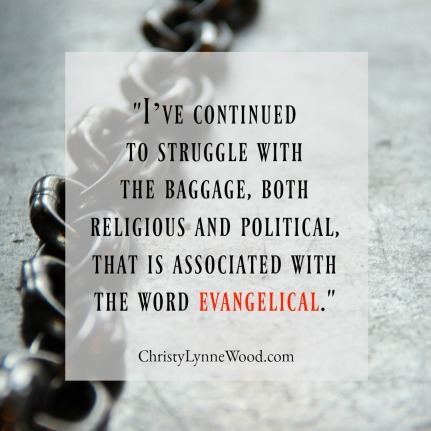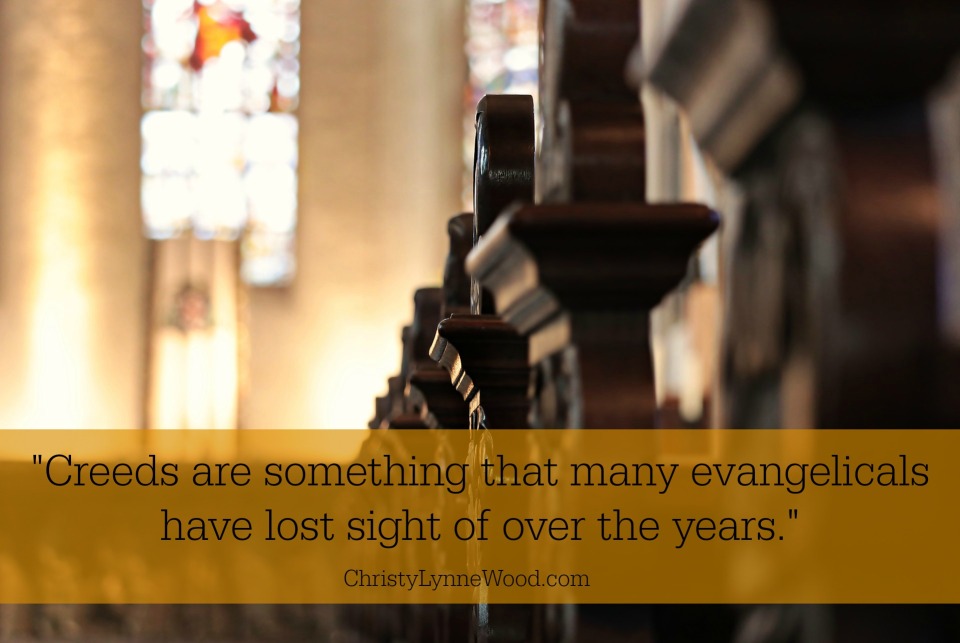Finding a New Name for My Christianity

About eighteen months ago I wrote a passionate blog post called I Don’t Want to be an Evangelical Anymore. My post was inspired by a quote I came across from Michael Steele, the former chair of the Republican National Committee. Angry with Evangelical leaders who were once again defending President Trump, Mr. Steele said,
“I have a very simple admonition at this point. Just shut the hell up and don’t ever preach to me about anything ever again. I don’t want to hear it.”
Yikes! As I processed this quote, I came to an important conclusion. I don’t think I want to call myself an Evangelical anymore. It didn’t take long to discover that I wasn’t the only one who felt this way. Greg Stier, the founder of Dare2Share Ministries posted this quote on his Facebook account.
“What could be a new word for “Evangelical” that still means theologically orthodox and actively evangelistic but doesn’t come with the political and cultural baggage? #justwondering”
I couldn’t agree more. In my blog post I expressed my intense frustration and posed a few suggestions for change, but I didn’t really have any ideas for a new name or identity.

Since writing that blog, I’ve continued to struggle with the baggage, both religious and political, that is associated with the word evangelical. I’ve longed for a title that would describe my classical theology without causing people to automatically make assumptions about who I am as a person.
During some recent research for my new podcast coming out in late summer, I discovered even more people who felt similar to me, and they had a name for their set of beliefs. Guys, I now have a new phrase to describe myself and I love it. I actually used this phrase in a conversation with an unbeliever the other day as we talked about religion, and science, and God. And it felt fantastic! There wasn’t the push-back or shut-down that I have experienced before when I shared my faith. I was able to define myself and what I believe in a way that my new friend was interested in, in a way that encouraged them to ask more questions.
Are you going crazy with curiosity yet? Okay, I’ll tell you.
I am a Historical Christian.
What does that mean? It’s really pretty simple. I hold tightly to the core creeds of Christianity that have been passed down for the last two thousand years. My more peripheral opinions or preferences stay in the periphery. Let me share an example:
I believe in God, the Father almighty,
creator of heaven and earth.I believe in Jesus Christ, his only Son, our Lord,
who was conceived by the Holy Spirit
and born of the virgin Mary.
He suffered under Pontius Pilate,
was crucified, died, and was buried;
he descended to hell.
The third day he rose again from the dead.
He ascended to heaven
and is seated at the right hand of God the Father almighty.
From there he will come to judge the living and the dead.I believe in the Holy Spirit,
the holy catholic* church,
the communion of saints,
the forgiveness of sins,
the resurrection of the body,
and the life everlasting. Amen.*that is, the true Christian church of all times and all places
This is the well-known Apostles Creed. Although most likely the apostles themselves didn’t write it, it is a brief overview of their most important teachings and can be traced back to the forth century.

Creeds are something that many evangelicals have lost sight of over the years. However, they have been important to the historic church since the first century. Biblical scholars believe that the earliest creed is actually quoted by the apostle Paul in First Corinthians chapter fifteen. The way it is recorded suggests a quotation rather than an original thought. Here are verses three through seven.
“For I delivered to you as of first importance what I also received: that Christ died for our sins in accordance with the Scriptures, that he was buried, that he was raised on the third day in accordance with the Scriptures, and that he appeared to Cephas, then to the twelve. Then he appeared to more than five hundred brothers at one time, most of whom are still alive, though some have fallen asleep. Then he appeared to James, then to all the apostles.”
Historical Christianity, also known as Orthodox or Traditional Christianity, has been a beautiful discovery for me. It has put words to the thoughts and feelings of my heart while at the same time giving me a community and a sense of belonging.
For a while now I have felt a little lost. I saw through a lot of the religious facades in many evangelical settings, but I couldn’t give up my orthodox beliefs. I didn’t belong in the Progressive Christian circles, but neither did I belong in more Conservative Evangelical ones. I was just floating around in the middle somewhere. I know that many of you have felt that way too. Well guess what? We are not alone, and we have a home.
As Historical Christians we can fully embrace Biblical authority, a crazy big and powerful God who created the world, the literal Fall of humanity into sin, and the Savior, Jesus, who came as a person both to show us God and restore our relationship with Him. At the same time, those Christian beliefs tell people nothing about our political leanings. They give no insight into our stance on issues of social justice. And that is so refreshing!
Too often Christianity has been divisive rather than unifying. We focus on the differences in our peripheral beliefs rather than the common core beliefs that unite us.
I love that I have Historical Christian brothers and sister who cross denominational lines. Not just within other evangelical denominations, but within the mainstream denominations such as Anglican, Lutheran, and Episcopalian. I’m excited about my family in Christ who has different worship preferences or traditions. I look forward to learning from them. We can be different and still believe in the same beautiful core truths of Christianity. There is a unity that is powerful. It provides connection back through history as well as with the world wide church today. 🙂

I’m really curious about your thoughts! Please feel free to share. I’ve gotten a lot of my information from Alisa Childers, both on her website and podcast. If you want more, I’d encourage you to check her out.
One final thought: The interesting thing about Historical Christianity is that while it unites me with my family in Christ across denominational lines, it also stands firmly against the Progressive Christian ideas that are creeping into the church as a whole. But that’s an entirely different topic that I will tackle next time!



0 Comments
Joel Nickerson
Nice!
Christy Lynne Wood
Thanks!
tonycutty
Loving watching your spiritual walk, so much of which is practical as well as mystical 🙂
I too want to shed Evangelical labels; in fact I want to shed *all* labels.
It seems that every time we find a new name to dissociate ourselves from the horror story that is modern Evangelicalism, it’s not long before they pirate that new name too. So, ‘Born Again’? Stolen. ‘Jesus follower’? Yup, stolen. ‘Grace Church’? Stolen. Everything we invent that dissociates us from the nasty stuff, gets appropriated by those from whom we are trying to distance ourselves.
But ‘Historical Christian’? I’m glad you have found a new name that you like, and I hope it’s a long time before the Evangelicals steal that one too. In fact I think that this one might just last! The reason I feel that is that, because it involves some thought and explanation, it *just might* be too much for them to take on board!
I love it!
Christy Lynne Wood
I always love your comments, Tony! And I love the way we can journey together even from across the pond. 😀
tonycutty
Hehe yeah I love that too 😀
Josh18
I find myself living paradoxically as orthodox-yet-protestant, progressive-yet-notthatkind, conservative-yet-radical, valuing mercy-yet-Justice, ultimately needing so much to “walk humbly with my god.” I think every generation is called to simultaneously hold fast to old truths and move beyond old corruptions. It is a relational journey to walk with god. I sometimes, to unwrap the baggage say that I am simply a “follower of Jesus” and usually say that I am passionately “non-denominational” (though love some things that I see in many denominations/churches). I even identify a bit as a “Christian mystic” in a nnuanced or academic sense (believing in very personal relationship and experiencing heartfelt presence and guidance from God), but wonder at what others might assume if they hear that title. While I embrace the mystery and rest in the paradox, I do fear being misunderstood and tire of needing to offer caveats.
I love your enthusiasm and have been looking forward to hearing your thoughts on this. There is much alluded to in that Jesus talked about “old/new wine/wineskins”. I believe this shows that every generation must value and yet break free from its history to shed human reason/corruption and grow anew. There are some significant one-on-one encounters between him and Peter that provide insight into the disciple/churches identity and purpose. We wrestle with the fine line of healthy spirituality that is an “earthly good” and must overcome the human grasp for control that sabotages our message of love without equally going to another extreme an losing our commitment to truth, righteousness, justice. What does it mean to walk in the spirit rather than the flesh and how does one positively influence this world? Paradoxically, true believers will always be religious “sticks in the mud” about historical truths, but I also believe Jesus modeled that we also always ought to be radical “pot stirrers” within religion—relearning and undoing the human traditions that weigh us down as the “wild one” leads (referring to the early Celtic believers name for the miraculously transformational Holy Spirit).
Traditional Christianity, like pharisaical Judaism suffers from the corruption of worldly wisdom and the natural human grasp for certainty/control. It oft misses the big picture and quashes the true repentance (changed thinking) required to be like Jesus. Sometimes we say, “relationship not religion.” We are wrestling with unhealthy spirits of religion (not merely flesh and blood). But the enemy wins a point too by making “religion” a bad word. Faith can become willful ignorance absent courageous self-examination, truth can become part of a lie when perspective is limited or reason corrupted, righteousness can become performance/pomposity when seen as from us instead of from God, etc. People rightly see the dangers/failures in “religion”, especially “historical” religion.
Changing language can be a powerful step ahead, but can be perceived as well as a giving of ground. I could be oversimplifying, but the “Evangelical” title came about to indicate just what you have described — (1) a declaration that you believe in something with a real historical basis and continuity, and (2) that this reality implies certain truths so profound they are worth “evangelizing” for. Unfortunately, in time evangelicals have gone on a pendulum swing from disengagement from politics to extreme obsessions with it (always there are many on a spectrum wretlingnand balancing from the trend of the whole). This move was not unwarranted, but coopted by world, flesh, and devil. Many swords have been drawn and many ears cut off. At what point did “evangelical” cease to be a positive distinction and hit the break-even point with negativity? Is the answer a new definition? What does the search for this say about our own feelings of powerlessness to influence within? Maybe it’s time to cast of an old wineskin and carry a new one . . . While acknowledging the utility of the old one and seeking to learn from its history.
—————-
Meanwhile, I wonder, where does this “historical Christian” label originate? At what point do we call ourselves “historical” versus another title? How does that not just sound like a plain vanilla, non-statement . . . like basically just “Christian”? And how do I get away from this feeling like I would drawing people’s minds to historical failures of Christendom or saying, “I am a dinosaur.” 😛
I ask these questions to intuit ramifications of the label or to explore matters of import rather than be negative.
Christy Lynne Wood
I appreciate your thoughts! 😀
Christy Lynne Wood
I appreciate your thoughts and questions! 😀
theturkscribe (@theturkscribe)
I’m just so right there with you in all of this. It’s a roller coaster of trying to find my place in Christendom. I struggle with teachings with one of the same ministries and yet I have gotten so much out of it as well. I do not want to be identified politically with my faith. I’ve been to big famous churches (unfortunately too famous recently) for years and that just didn’t work out for me. And then funny enough, recently I stumbled across some videos on YouTube about some orthodox Christian churches talking about something you’re talking about as well with the historical aspect. It’s fascinating to me. I feel super comfortable right now just calling myself a Christian (although I love it when people just identify themselves as disciples, that seems bold to me) and I don’t feel like I have to define it any further than that or come up with a set thing of ideas and adhere to them anymore. I think my Unitarian roots are coming out and saying hey it’s ok to take some wisdom from this place and apply it here, or this place has good teaching on that but just actual living out my Christian community and worship life in my smaller church now that I love. I don’t expect any church to be perfect any more or any ministry to be perfect I’m just living the faith as best I can, trying to stay connected to God and keep stumbling.
Christy Lynne Wood
I love it! 😀
michalskisgreatadventure
It’s a good question to ask, what our true identity is in Christ, with so very many labels floating around to choose from…It reminds me of Paul’s rebuke against the early church, saying they followed Apollos or Paul…For me, it comes back to one, fundamental name. I am a Christ-follower. I just can’t belong to any other name. When people ask what denomination I belong to, I simply answer, “I don’t belong to a denomination. I believe in Jesus, and I follow the Bible.” But I am also happy that you have found an identifying group of Christians across the world who are dedicated to that straightforward approach to Christianity that began in the early church, and has become so vastly splintered over time!
gregorgardner
Hi Christy,
First time commenting here–have enjoyed your writings. I appreciate and share your struggle with labels.
It is easy to dismiss the very need to “label” ourselves as a reductionist ego-driven triviality. However, it is a fact that the words we choose to use in our communication with others, to “identify” ourselves, really do matter in the real world. Excessive political correctness has really muddied the waters in recent times, however one positive result of that unfortunate phenomenon is that it has impelled me to be more thoughtful and precise about terminology, unconscious biases, etc.
In any case, I deeply share your discomfort with people making false assumptions about you based on how you choose to identify yourself (e.g. “Evangelical”)–and, indeed, judging you on that basis. And I share your desire to find a term that accurately describes your faith and resonates with you personally.
I was just baptized last year at age 58. I’ve been experiencing a period of vigorous spiritual exploration, learning, and inquiry over the past 2 years. Unlike previous inconclusive “spiritual episodes” that have occurred over my life, somewhat cyclically, since age 18, this time I have emerged/am still emerging with Jesus Christ as the clear focal point of my spiritual faith and practice. The two greatest barriers to me getting serious about Christianity were/are (1) sincerely embracing “Thy will, not mine”–my ego rebels against that daily; and (2) the perceptions/judgments of others (friends, family, acquaintances, whoever) in the mostly secular world of people in which I live. Identifying as “Christian” is problematic due to the latter.
Furthermore, although my beliefs at this point have evolved to being clearly Jesus-focused, they are still eclectic. There are aspects of “my” Christianity drawn from a number of different traditions and denominations. Because of this heterogeneity in my faith–as well as my discomfort at people making false assumptions about me based on their understanding of some label–I am frankly at a loss with how to accurately describe my “spiritual identity” when the need or opportunity to discuss religion with people arises…
I have thus far just used “Christian” but definitely cringe at all the baggage associated with that term. For many years, if someone told me that they were Christian, I recoiled inside, fearing that they were self-righteous, judgmental, goody-goody, etc. etc. So I know from experience what some people are thinking when I dare to “admit” that I am a “Jesus-Follower”. Nonetheless, I have used that term because my integrity requires that I do. And then I explain a little more about what I mean by that…
I like the meaning of “Historical Christian”. Alas, even that term can be perceived in many different ways. For some folks, “historical” is a positive–grounded, rooted, pure, etc. For others, “historical” has negative connotations.
At the end of the day, I think any “label” is destined to be interpreted in multiple ways, depending on who is doing the interpretation. And that may feel, to us, as MISinterpretation. Every form of self-identification (e.g. “scientist”, “Republican”, “Democrat”, “Midwesterner”, “artist”, whatever) will have certain connotations connected with it in the eyes of each beholder.
We can’t control people’s reactions to anything–at least not their initial reactions. But (1) each of us can do our best to identify/create/use a term that comes closest to sincerely expressing our genuine intentions and beliefs and (2) from that point on, we can, through respectful dialogue–if given the chance–describe to others what it means to us.
Finally, it is reassuring and wiser for me to focus on living my beliefs and doing my best to let go of caring what others think about me. (An example of this in action: a Christian client of mine strongly influenced my spiritual journey by neither hiding nor preaching, but simply humbly living his faith in his interactions with me. That dissolved my initial judgment of, and resistance to, him as a “Christian”…)
Thanks for your thoughts and the opportunity to express ours…
Christy Lynne Wood
Thanks for taking the time to comment! I love it. I love that you are finding a real relationship with Jesus and that you are able to have an eclectic version of Christianity. 😁 Seriously, thanks for not giving up and for being an example to others. That means a lot!
Pingback: